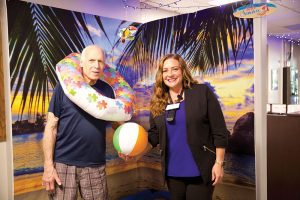By Ronald Ziemba, Peoria Area SeniorNet
This sounds like a simple question, but when examined, it turns out to be more complex than it sounds. My background is with computers and here is what I found.
Shortly after I retired a fellow retiree asked me to join SeniorNet. SeniorNet is an organization that teaches computer classes to seniors. I was reluctant at first but I eventually learned more about SeniorNet and I joined. I became a coach and then an instructor. A coach is a teacher’s aide and really doesn’t need to know much more than how to follow the step by step instructions the instructor gives the students in class.
All the coaches and instructors are seniors. This makes it easier for the students to accept help from the coaches because it’s not like asking your grandson for help. He will go too fast or he will do it for you. That’s not how SeniorNet operates. The coach will tell the student what to do but the student, not the coach, will do it. And generally, the classes go at the speed of the slowest student. The philosophy is “No-Student-Left-Behind.”
After being involved with SeniorNet for a while, I started teaching introductory classes at the Chillicothe Library. SeniorNet has taught classes at the Peoria, Peoria Heights, Washington, and Alpha Park (Bartonville) libraries. Most, probably all, libraries have computers for their customers and most library directors welcome the chance to hold classes that will make their customers more knowledgeable so that they can use those computers.
Many, and perhaps most, of the students in these library classes were seniors. The classes I taught there were beginners’ classes. They started with a general introduction to using the computer and then covered several uses of the computer, but none in great detail. In college we would call this a survey class. I learned that the students would be interested in only certain subjects. They came to the class with a specific goal in mind. Some only wanted to use the computer to keep the minutes from one of the organizations they belonged to. Some only wanted to send emails to their children and grandchildren. Some only wanted to manage their photographs. After the classes we might get emails from the students saying something like, “Today I sent my first email all by myself” or “Today I ordered my first shirt online.”
I concluded that the simple answer to the question about seniors using computers was yes. They wanted to use them, but maybe for specific uses only. After a while they would become comfortable with the computer. But then they would talk with friends and family and find out what others were doing with their computers. Some of those uses would appeal to the senior and they would try them. Eventually some of the new things could take up more time than the original uses.
So, what is stopping some seniors from trying a computer? One issue is fear of the keyboard or mouse. Remember the clerks in the army from some old movies. They became the company clerk knowing nothing about the typewriter and its keyboard. They had to use the hunt and peck method and after a while they could type almost as fast as the person who had keyboard training. The same is true of the mouse. Most only have two buttons which are pressed by the index and middle fingers. Most people are pretty good with those two fingers. The bigger problem is to regain the fine motor control that is needed to position the mouse on the computer screen. This skill also gets better with time. Finally, they fear they will break it. While it is possible to delete things unintentionally, “breaks” don’t break anything and can be fixed by a more experienced computer user or a repair shop if necessary. They can recover the deleted data.
A while back AARP said in one of its articles that in any large city—like New York, Chicago, or Boston—two-thirds of the seniors never leave their homes on a given day. They may be afraid or they may have transportation or mobility issues or any of several other causes may keep them at home. The computer can help to relieve this isolation issue. Social media, email, chat rooms, and many other programs can keep a senior engaged and involved without ever leaving home. Recent AARP publications have also addressed the isolation issue. Isolation is a serious problem and can lead to depression and other issues for seniors. It is even thought that there is a relation to Alzheimer’s disease and other forms of dementia.
The question is also becoming less of an issue as more and more new seniors have used the computer at work and are less fearful or stressed with the thought of one. However, their use at work was often limited to a few functions needed to do a particular job. They might be totally unfamiliar with many of the tasks that can be done with a computer.
SeniorNet has also evolved, partly because of what we learned. Where we would have had an internet class that met six times, we now have separate one session seminars and workshops. Instead of embedding topics into a longer internet class, we might have seminars on using the internet to gather medical information or using the internet for trip planning. This allows the student to pick the topic or topics that are of interest to him or her.
All of our classes end with the students completing a critique. We solicit ideas for new classes, seminars, and workshops from those critiques. The student responses tell us what topics we should be teaching. And we will respond to those ideas if possible.
Another part of the SeniorNet evolution is the inclusion of new devices. We have long had classes on the internet, word processing, photo editing, and digital cameras and more recently we added cell phones, tablets, and social media to our offerings. As the technology changes, computers and SeniorNet will change to accommodate the changes.
For example, seniors are now becoming more and more comfortable with cell phones. SeniorNet offers multiple cell phone classes for iPhones and Android phones. The classes cover things such as photography with the phone, apps, texting, calendars, and other topics.
And the best part is that classes are almost free. There is no charge for classes but there is a small materials charge of $1 or $3. Each class comes with printed instructions. They generally are not used in the class as the instructor normally gives the students step by step instructions in class. But they are invaluable when the student goes home and tries to duplicate the work done in class. Eventually the student will perform the function several times and the instructions are no longer needed. But if he or she forgets, the instructions are always available.
What about other technology? We have seen the acceptance of smart phones by seniors. And we are being bombarded by smart doorbells and thermostats as we watch TV. Give them a little time and seniors will accept these and other new technologies when they recognize how the new technology will benefit them.
To learn more about SeniorNet, visit our web site at www.PeoriaAreaSeniorNet.org or visit the site with a friend if you are not yet ready to use the internet by yourself. There you will find an invitation to our Open House on March 18, 2023. We hope to see you there.
For additional infomative and inspirational articles, visit 50 Plus News and Views Greater Peoria Area online today.











